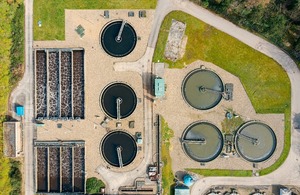New Water (Special Measures) Act measures come into force
Water companies will now have to publish plans to reduce pollution incidents and address the use of nature-based solutions when managing wastewater.

Pollution Incident Reduction Plans
Water companies must be transparent in their efforts to prevent pollution from 23rd June as a new legal requirement in the Water (Special Measures) Act comes into force (Section 3).
New rules make it mandatory for water companies to prepare and publish Pollution Incident Reduction Plans (PIRPs).
These outline how companies will identify, respond to and reduce sources of sewage pollution incidents in their network each year. This includes actions like increasing monitoring, investing in technology and infrastructure and carrying out awareness campaigns for customers.
They will need to publish these plans by 1 April each year, and report on the progress made since their previous plan. The first plans will be published by 1 April 2026 and scrutinised by the Environment Agency.
This new legislative requirement will make it easier for the public to see what actions water companies are taking to reduce pollution in our waterways, and hold them accountable on their progress as they work to cut sewage spills by 45% by 2030.
As this is now a statutory requirement, failure to produce a PIRP in line with guidance is an offence, and could lead to a fine.
Environment Secretary Steve Reed said:
From today, the latest measure in the landmark Water Act will force water companies to publish specific plans on how they will tackle sewage pollution in local communities.
This measure will increase transparency and accountability in the sector—focusing bosses’ minds on cleaning up our waterways for good.
Nature-based Solutions
Water companies will have to address how they will use nature-based solutions within their networks from 23rd June as a new legal requirement of the Water (Special Measures) Act comes into force (Section 5).
New rules require water companies to consider nature-based solutions within their statutory Drainage and Wastewater Management Plans (DWMPs) - for instance the construction of wetlands rather than water recycling centres to help clean sewage effluent before it is released back into the wider environment. Another example could be riparian buffers—a border of vegetation next to a river or stream which helps improve water quality and protect it from surface runoff while providing habitats and reducing erosion.
New legal requirements mean companies have to specifically explain if and how they are using nature-based solutions within their networks, the benefits these systems have and provide transparency around their decision-making process.
This will improve transparency in this area, so the public knows that nature-based solutions have been considered and can understand why natural solutions have or have not been proposed in each case.
Alongside cost-effectiveness and sustainability, nature-based solutions provide additional benefits for people and the environment—like improved water quality, reduced flood risk and new habitats for biodiversity.
Environment Secretary Steve Reed said:
From now on, water companies must explain how they are using natural and sustainable solutions to clean up our waterways.
This measure is yet another step in the Government’s plan to clean up our rivers, lakes and seas for good.
Updates to this page
-
Further information about Section 3 Water (Special Measures) Act added.
-
First published.